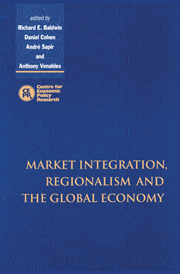Book contents
- Frontmatter
- Contents
- List of figures
- List of tables
- Preface
- Acknowledgements
- List of conference participants
- 1 Introduction
- PART ONE REGIONALISM AND THE GLOBAL ECONOMY
- 2 Regionalism vs. multilateralism
- Discussion
- 3 Preferential agreements and the multilateral trading system
- Discussion
- 4 Politics and trade policy
- Discussion
- 5 Globalisation and labour, or: if globalisation is a bowl of cherries, why are there so many glum faces around the table?
- Discussion
- 6 Openness and wage inequality in developing countries: the Latin American challenge to East Asian conventional wisdom
- Discussion
- PART TWO MARKET INTEGRATION AND REGIONALISM
- Index
Discussion
Published online by Cambridge University Press: 24 February 2010
- Frontmatter
- Contents
- List of figures
- List of tables
- Preface
- Acknowledgements
- List of conference participants
- 1 Introduction
- PART ONE REGIONALISM AND THE GLOBAL ECONOMY
- 2 Regionalism vs. multilateralism
- Discussion
- 3 Preferential agreements and the multilateral trading system
- Discussion
- 4 Politics and trade policy
- Discussion
- 5 Globalisation and labour, or: if globalisation is a bowl of cherries, why are there so many glum faces around the table?
- Discussion
- 6 Openness and wage inequality in developing countries: the Latin American challenge to East Asian conventional wisdom
- Discussion
- PART TWO MARKET INTEGRATION AND REGIONALISM
- Index
Summary
The modern literature on ‘regionalism versus multilateralism’ was born in 1991, of two exceptional parents. One, Bhagwati (1991), asked the key question: are regional trade arrangements (RTAs) ‘building blocks’ or ‘stumbling blocks’ toward multilateral trade liberalisation? The other, Krugman (1991), offered a formal model for investigating the consistency of RTAs with the multilateral trading system.
Alan Winters in chapter 2 provides a survey of the recent theoretical and empirical literature, seeking to answer Bhagwati's original question.
He focuses mainly on theoretical contributions, which he summarises remarkably. He also reviews some empirical evidence, dealing primarily with the European Community.
The seminal piece by Krugman showed that global welfare is maximised when the number of trading blocs is either equal to one (global free trade) or very large (each bloc behaving like a ‘small country’ and adopting unilateral free trade). The worst situation for global welfare is obtained when the number of blocs is three, an ominous result in view of predictions that the world might be evolving toward blocs centred on the European Community, the United States and Japan.
Krugman's result is based on a number of economic assumptions regarding the structure of production, consumption and trade. In particular, the following assumptions are made with respect to trade: (1) the world is divided into blocs of equal size; (2) blocs play a one-shot Nash game in tariffs; and (3) each bloc sets its tariff so as to maximise social welfare. The recent literature has attempted to relax all three assumptions.
- Type
- Chapter
- Information
- Market Integration, Regionalism and the Global Economy , pp. 49 - 52Publisher: Cambridge University PressPrint publication year: 1999



